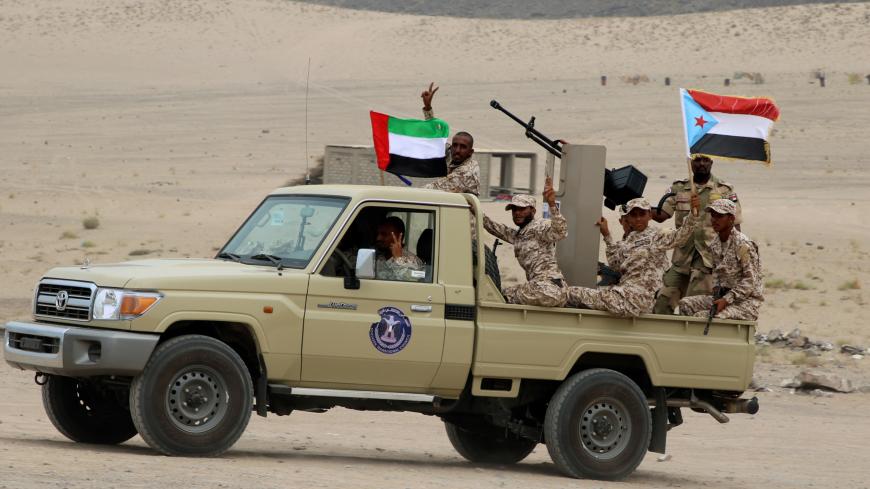Yemen’s Southern Transitional Council emerging as a dominant force in the south has shifted the country’s political dynamics. The faction faces opposition not just from President Abed Rabbo Mansour Hadi’s government but within the southern movement itself.
The STC emerged in May 2017 and declared independence later that year, operating with its military wing the Security Belt and UAE-backed elite forces in southern governorates like Hadramawt and Shabwa. It has formed a parliament and cabinet with formal government positions and presented itself as a legitimate state actor.
Following unification between the north and south in 1990, many people in the south, where most of the country’s natural resources are located, felt the unification left them economically and politically disadvantaged, leading to the emergence of the Southern Movement and various other secessionist pushes in 2007.
Though it presents itself as the legitimate representative of southern Yemen, Nabil al-Boukiri, an independent Yemen affairs analyst, told Al-Monitor that the Security Belt is entirely funded and trained by the UAE, which seeks a friendly independent southern state to control the port city of Aden.
The STC shares the UAE’s hatred of the Islamist al-Islah party in Yemen. The UAE has used the Security Belt to occupy the south, most recently moving to occupy the island of Socotra on Oct. 4.
Fernando Carvajal, a former member of the UN Security Council Panel of Experts, told Al-Monitor that despite some divisions within the organization, “there are no overt conflicts. The leadership has so far done a good job keeping Salafi elements and tribal loyalists united for now.” He added, “The STC and Security Belt Forces are interdependent. The weakening of one will weaken the other, financially or with regard to popular support.”
Yet while the UAE-backed factions have maintained a degree of cohesion, other southern movements threaten their agenda with diverging aims. Some seek full governorate autonomy, while others back the federal project or oppose the STC’s representation of the southern movement.
“The divisions are among the other southern components of the movement, such as the Baum faction and the South National Council faction supporting the federal project of Yemen and other southern components,” said Boukiri.
Since the STC's coup attempt on Aden Aug. 10, such differing visions for southern Yemen have threatened to trigger disputes and conflict in the event the STC gains further control of the south. On Sept. 3, the sheikh of Mahra, Ali Saleh al-Huraizi, who opposes Saudi and Emirati influence, announced the formation of the Southern National Salvation Council in Mahra in reaction to the coup.
External factors trigger further divisions across the southern political landscape.
“Mahra is the biggest challenge for the STC because of the role played by Oman. Local tribes don’t want conflict, so they maintain limited representation within the local STC group, while still retaining ties to Oman,” said Carvajal. He explained they are playing a balancing act between both sides, as Oman traditionally wielded strong influence over Mahra's elites.
“Parts of the Abyan Hirak [movement] have yet to align with the STC because they still have hope for Hadi, who is from Abyan. Part of Hirak in Shabwa is funded by Hadi through his strongest allies, also preventing STC monopoly over Hirak in this oil-rich province,” he added.
These parts of the southern movement in Abyan and Shabwa that are independent from the STC originate from the original Hirak formed in 2007, evidence that the faction has been unable to unify the wider Hirak movement. The STC contains only a portion of the movement’s original members.
There are currently dozens of southern movements operating outside the STC’s command. Yet due to the extensive UAE support for the STC and its secessionist militias, it is still the dominant southern faction.
Loud calls for governorate autonomy come from within Hadramawt, as Hadrami elites displaced by those working with the UAE fight to reclaim their lost influence.
Independent Yemeni researcher Fuad Rajeh told Al-Monitor that divisions across Yemen's southern governorates could give rise to further demands for independence.
“Oil-rich Hadramawt, which has a land area of more than 193,000 square kilometers, would seek autonomy,” said Rajeh. “Its leadership has been warning the STC against any moves. Mahra in the far east and Yemen's second largest province will join Hadramawt and seek autonomy.”
While there may be popular support for southern secession, the UAE’s ties to the STC have generated much opposition toward it. Yet without crucial UAE support for the Security Belt, it will very likely implode.
Boukiri said, “These divisions are normal amid the UAE’s seeking to enforce the idea of partition by force to the benefit of a side that it backs, but that doesn’t have much popularity in the south, which is the STC.” He added that the oil-rich provinces of Shabwa and Abyan will oppose STC control.
“These divisions represent a blow to the UAE, which is eyeing seaports and islands and seeking to achieve a victory through separation amid the Saudi-led coalition's failure to beat the Houthis,” Rajed said.
“The south in general is not a single bloc that can be directed according to the desire and interest of any party,” said Boukiri.
UAE-backed factions are clearly seeking to impose their will by force. Reports in 2017 emerged of a Security Belt-run prison network run by UAE-backed southern militias and accused of torture and other human rights violations. These factions, such as the Shabwa, had carried out arbitrary arrests and intimidation campaigns, causing tension with local factions.
Emirati airstrikes on government forces in Aden following their recapture of the city after the STC’s Aug. 10 coup attempt show they are seeking to maintain control there.
“The UAE does not know the nature of Yemeni society well and therefore operates in the wrong way. These divisions are the result of an Emirati effort that does not serve Yemen, its security and stability, nor is it in the interest of the UAE,” Boukiri added.








